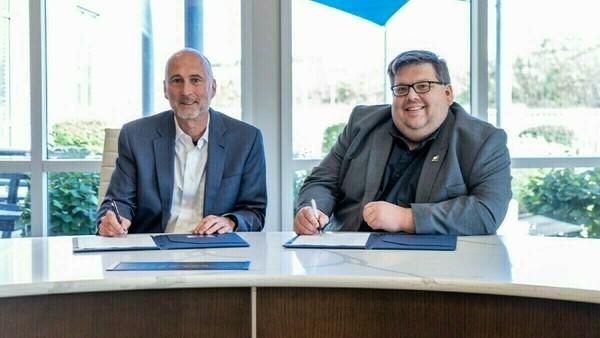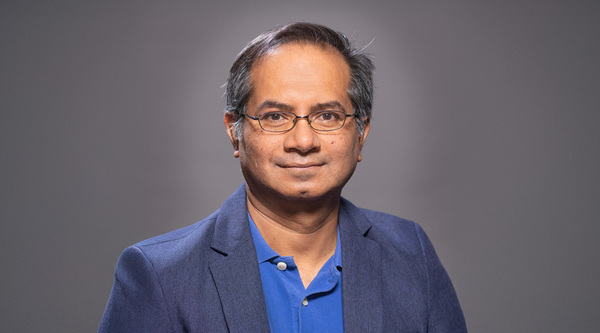Universities are critical to national security, argues Notre Dame vice president for research Jeff Rhoads
University of Notre Dame vice president for research Jeffrey F. Rhoads contributed to a panel discussion on university-industry partnerships, arguing that universities play a critical role in ensuring national security and global competitiveness.
The panel took place on August 7, 2024, in Washington, DC, as part of the second annual meeting of the Emerging Technologies Institute conference. The event brought together technology leaders in government, the defense industry, the commercial sector, and academia to discuss national security and innovation needs.
Rhoads, also a professor in Notre Dame’s Department of Aerospace and Mechanical Engineering, was joined on stage by Rodney Bowersox, senior associate dean for research at Texas A&M University’s College of Engineering; Mark Lewis, president of the Purdue Applied Research Institute; and Theresa Mayer, vice president for research at Carnegie Mellon University. Bindu Nair, director of Basic Research in the Office of the Under Secretary of Defense for Research and Engineering, served as the moderator for the panel.
Rhoads highlighted the need for universities to foster innovations that can ensure national security in a time of rapid technological change, saying, “To face the challenges of tomorrow, we need all hands—industry, academia, and government—on deck.”
Rhoads explained that Notre Dame’s commitment to national security has a long history. “We are a University where ‘God, Country, Notre Dame’ is literally etched in stone above the door of our Basilica. Service to our country is part of our mission,” Rhoads said. “That gives us a mandate to think carefully about peacemaking and the right way to support the national security innovation ecosystem.”
Rhoads’s main message to his audience of Department of Defense and national security professionals was to rethink the way they partner with academic institutions.
“Many of our nation's competitors around the world may not have market economies or the democratic freedoms that we have; in many cases, the governments may be fully integrated with academia,” Rhoads explained. “It’s essential that we also have vertical integration—but in a way that aligns with our nation’s democratic values and respects our freedoms.” We can do that, Rhoads said, through “true partnerships, where university researchers learn from industry in order to ensure the research that happens on campus translates into the real world.”
Rhoads encouraged industry professionals who have not partnered with university researchers before to consider a shared research project.
“We are not the universities of ten years ago,” Rhoads said, “If you haven’t had a chance to partner with a university, I think you’ll be amazed at the value a university can bring to the innovation ecosystem.”
To learn more about Notre Dame’s mission as a leading research institution, please visit https://stories.nd.edu/podcasts/notre-dame-as-a-leading-research-university/ or contact research@nd.edu. To sign up to receive news and updates about research at Notre Dame, please visit https://research.nd.edu/news-and-events/newsletter/subscribe/.
Contact: Brett Beasley / Writer and Editorial Program Manager
Notre Dame Research / University of Notre Dame
bbeasle1@nd.edu / +1 574-631-8183
research.nd.edu / @UNDResearch
About Notre Dame Research:
The University of Notre Dame is a private research and teaching university inspired by its Catholic mission. Located in South Bend, Indiana, its researchers are advancing human understanding through research, scholarship, education, and creative endeavor in order to be a repository for knowledge and a powerful means for doing good in the world. For more information, please see research.nd.edu or @UNDResearch.
Latest Research
- Karen Deak named Executive Director of Notre Dame’s IDEA CenterKaren Imgrund Deak, pictured above, has been named executive director of the IDEA Center at the University of Notre Dame. Karen…
- Hope, Legacy, and the Fight Against Brain Cancer: The Story Behind the Hahn-Pflueger Brain Cancer Scholar Program“The most powerful thing in this world is hope,” said Rex Pflueger,…
- Notre Dame, Beacon Health System announce new, multiyear research collaborationThe University of Notre Dame and Beacon Health System have announced a new, multiyear research collaboration. Through this agreement, Notre Dame and Beacon will jointly develop collaborative, health-focused research projects that are of interest to both organizations, particularly in the areas of oncology and health data.
- Fighting to cure brain cancerTo better understand glioblastoma, an aggressive brain cancer, a Notre Dame researcher thought outside the box—and off planet Earth. Read the story
- ND electrical engineer Ranjan Singh named founding editor-in-chief of APL Engineering PhysicsRanjan Singh, professor of electrical engineering at the University of Notre Dame and pioneer in terahertz photonics, spintronics and metamaterials, has been named founding editor-in-chief of Applied Physics Letters (APL) Engineering Physics.
- Exceptional faculty recognized as Notre Dame’s 2025 All-Faculty TeamNotre Dame has a long history of outstanding student-athletes being named to All-America teams. The University also has a tradition of honoring exceptional faculty on the football field each fall. At every home game, the provost honors a distinguished member of the faculty. These seven scholar-teachers…












